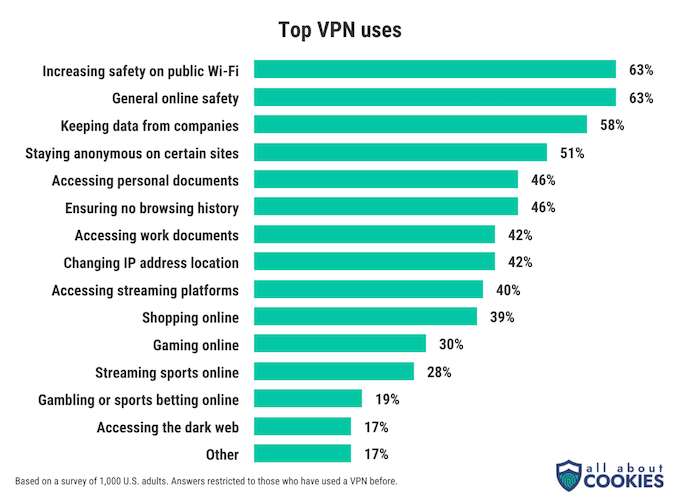A 2023 consumer survey of 1,000 US adults by All About Cookies found that one of the top uses for Virtual Private Networks (VPNs) was safety, with more than half saying they have used a VPN to keep their personal data away from corporations and advertisers (58%), or to maintain anonymity on certain websites (51%). In all, 56% of all VPN users are “Mostly” or “Very” confident that they are “truly anonymous” when using one.
And yet, the All About Cookies survey found that 57% of active VPN users use a free VPN service as their primary VPN. Free VPNs are more likely to pose extra security risks, including malware and some free VPN services log and sell user data, which negates one of the key reasons they use VPNs.
These findings further confirm a November report by Digital Citizens Alliance, which detailed that Internet users entrust VPN providers with personal data including the user’s name and credit card information, exact IP address and geolocation, and every action the user undertakes online, including every website visited and every activity on that website.
Copyright infringement
A smaller, but still significant, portion of users have used their VPNs for more taboo purposes. More than a quarter have used a VPN to get around local blackouts or access unauthorized sports streams online, while around one in five have used a VPN to gamble online (19%) or access the dark web (17%).

Counterintuitively, the survey found VPN usage to be highest among baby boomers (47%, and lowest among Gen Z (21%).
Further reading
Just 55% of people actually know what VPNs do [Survey]. Article. December 13, 2023. by Josh Koebert, Mindy Woodall. All About Cookies.
10 Reasons not to use a VPN (and 4 reasons you should). Article. August 17, 2023. by Andrew Adams, Catherine McNally. All About Cookies.
Why it matters
VPNs are well known as vehicles used by consumers to make themselves anonymous and to access illegal services – and to do both.
What many consumers do not realize was that every move the consumer makes is tracked by the VPN provider – and that many (if not all) VPN providers cooperate with investigative requests by law enforcement and copyright authorities researching criminal actors.












